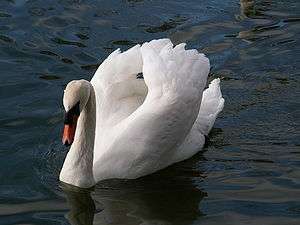Definify.com
Webster 1913 Edition
Swan
Swan
Webster 1828 Edition
Swan
SWAN
,Definition 2026
Swan
Swan
English
Noun
Swan (plural Swans)
- (soccer) someone connected with Swansea City Football Club, as a fan, player, coach, etc.
- 2013, Delme Parfitt in Wales Online, Cardiff City 1 - 0 Swansea City: Steven Caulker heads Bluebirds to South Wales derby win (3 November 2013)
- The Swans will doubtless recover, but they will head home this evening knowing that they didn't do themselves justice in a game that means so much to supporters.
- 2013, Delme Parfitt in Wales Online, Cardiff City 1 - 0 Swansea City: Steven Caulker heads Bluebirds to South Wales derby win (3 November 2013)
- (Australian rules football) someone connected with the Sydney Swans, as a fan, player, coach, etc.
Proper noun
Swan
- A surname.
Anagrams
swan
swan
English

Noun
swan (plural swans or swan)
- Any of various species of large, long-necked waterfowl, of genus Cygnus, most of which have white plumage.
- (figuratively) One whose grace etc. suggests a swan.
Derived terms
Translations
|
|
See also
- cob (adult male)
- cygnet (epicene, young)
- lamentation
- pen (adult female)
Verb
swan (third-person singular simple present swans, present participle swanning, simple past and past participle swanned)
- (Britain, intransitive) To travel or move about in an aimless, idle, or pretentiously casual way.
- 2010, Lee Rourke, The Canal, Melville House Publishing (2010), ISBN 9781935554905, unnumbered page:
- He swans around that stinking office in his expensive clothes that are a little too tight for comfort, he swans around that stinking office without a care in the world.
- 2013, Tilly Bagshawe, One Summer’s Afternoon, HarperCollins (2013), ISBN 9780007472550, unnumbered page:
- One of the few strokes of good luck Emma had had in recent days was the news that Tatiana Flint-Hamilton, her only real rival for top billing as 'most photographable girl' at today's event had decided to swan off to Sardinia instead, leaving the limelight entirely to Emma.
- 2010, Lee Rourke, The Canal, Melville House Publishing (2010), ISBN 9781935554905, unnumbered page:
Usage notes
- In the sense “to travel”, usually used as part of the phrase “to swan about” or “to swan around”.
Etymology 2
Probably from dialectal I s’wan, contraction of “I shall warrant”; later seen as a minced form of I swear.
Alternative forms
Verb
swan (third-person singular simple present swans, present participle swanning, simple past and past participle swanned)
- (US, dialectal or colloquial) To declare (chiefly in first-person present constructions).
- 1907 December, J. D. Archer, Foiling an eavesdropper, in Telephony, volume 14, page 345:
- "Well, I swan, man, I had a better opinion of you than that."
- 1940, Raymond Chandler, Farewell, My Lovely, Penguin 2010, page 214:
- ‘She slammed the door so hard I figured a window'd break […] .’ ‘I swan,’ I said.
- 1907 December, J. D. Archer, Foiling an eavesdropper, in Telephony, volume 14, page 345:
Anagrams
Old English
Etymology 1
From Proto-Germanic *swanaz, probably from Proto-Indo-European *swen- (“to sound, resound”). Compare Old Saxon swan (Low German Swaan), Dutch zwaan, Old High German swan (German Schwan), Old Norse svanr (Swedish svan).
Noun
swan m
Descendants
Etymology 2
From Proto-Germanic *swainiz, whence also Old High German swein, Old Norse sveinn, English swain (through Old Norse).
Noun
swān m
West Frisian
Etymology
From Old Frisian *swan, from Proto-Germanic *swanaz (“swan”), probably from Proto-Indo-European *swen- (“to sound, resound”). Compare English swan, Dutch zwaan, Low German Swaan, German Schwan, Swedish svan.
Noun
swan c